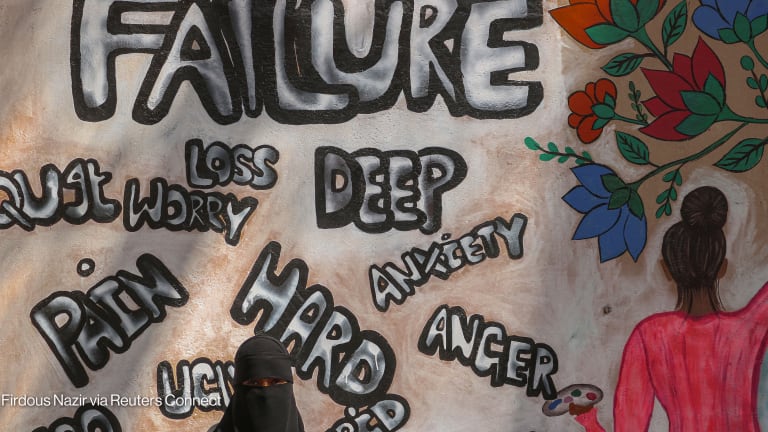
May is mental health awareness month, and for many of us these days, it’s rare that an hour goes by without someone sending us an article or a list of tips on how to address our anxiety, build our children’s resilience, or focus on wellness during this difficult time.
This may be one of the bright spots in the coronavirus crisis: For many in Europe and the United States, attending to our mental health is becoming a core part of our crisis response. But for millions of people around the world also caught in crises — whether those crises are hurricanes, conflicts, experiences of mass displacement, or other humanitarian catastrophes — it is estimated that only 2% have access to mental health and psychosocial support, or MHPSS. The question is, will COVID-19 offer us a chance to change this?
More on mental health:
► How to support displaced populations' mental health during lockdown
Although the mental health impacts of emergencies have long been recognized, formalized efforts to systematically address and mitigate these impacts only began in the early 2000s, when the United Nations and its humanitarian partners began developing and advancing guidelines concerning the protection and promotion of human well-being as well as the prevention and treatment of mental disorders.
Yet today, funds allocated to MHPSS in emergencies are still just a drop in the bucket of the total humanitarian response. Although 20% of emergency health care needs in crisis contexts involve mental or psychosocial health, less than 1% of all humanitarian funding is estimated to go toward meeting these needs. This is particularly concerning for the 52% of refugees who are children and face an increased risk of mental health and psychosocial problems. In young children, chronic trauma and adversity literally change the brain’s architecture, with lifelong negative physical and mental consequences.

Significant barriers to implementing MHPSS in crisis contexts exist. Many programs still lack the necessary research to demonstrate their effectiveness, and not enough humanitarian actors have sufficient mental health training to support delivery of these programs. Often those leading the response are themselves struggling with threats to their own psychosocial well-being and lack the necessary support. This leaves us with a global humanitarian response picture where the majority of people in need of MHPSS are left without these critical services.
But we now have a chance to change some of these trajectories and there are bright spots emerging. This week, the United Nations Secretary-General António Guterres spoke out and asked international actors to help those struggling with mental and psychosocial needs. He related that depression and anxiety “are some of the greatest causes of misery in our world” and how we need to stand by and help “frontline healthcare workers, older people, adolescents and young people, those with pre-existing mental health conditions and those caught up in conflict and crisis.”
Similarly, a little over a week ago the U.N. launched its revised COVID-19 Global Humanitarian Response Plan, which asks for about $6.7 billion to fund the fight against the pandemic and support the needs of communities already caught in crisis. As a hopeful sign in the fight for mental health support, the appeal explicitly aims to address the increased mental health and psychosocial needs at a time when these critical services are either interrupted or suffering from limited resources.
It also calls attention to MHPSS needs in various contexts. For example, in Venezuela, the quarantine may not only increase the risk of gender-based violence for people living in close quarters but also limit information about and access to critical mental health and psychosocial services. Syrians who have fled civil war are now facing the pandemic as another uncontrollable threat. And in many crises there is concern that children may get separated from their parents because of border closures, quarantine or illness, leaving them with unimaginable trauma and anxiety.
Simultaneously, COVID-19 has generated resources for humanitarian aid workers. There are webinars on mental health and psychosocial support hosted by the Centre for Humanitarian Health at Johns Hopkins University and their partners, and various briefing notes by the Inter-Agency Standing Committee, and training and resource tool kits by the International Federation of Red Cross and Red Crescent Societies.
Finally, novel efforts are being made to support households all over the world, such as the recent launch of a new storybook, “My Hero is You, How kids can fight COVID-19!” which talks directly to children to help them process difficult emotions associated with this crisis. This project is a collaboration of over 50 organizations working in the humanitarian sector and is being translated into over 30 languages.
In a crisis setting where lives are threatened by physical violence or lack of food and shelter, mental health services may seem challenging to prioritize. The World Health Organization reports that among people caught in conflict, one in five (22%), will have depression, anxiety, post-traumatic stress disorder, bipolar disorder, or schizophrenia, continuing to provide MHPSS services is critical to realizing the right to health — and to supporting people’s short- and long-term well-being.
The COVID-19 emergency is unprecedented and catastrophic for people everywhere. But in addition to the horror it will cause, it also offers us an opportunity to invest in and find ways to prioritize long neglected essential interventions and learn from them, as well as a chance to rightly broaden our definition of lifesaving.
Can we find ways to finally ensure for others the mental health and psychosocial services that many of us now recognize as critical in our own crisis response?
Search for articles
Most Read
- 1
- 2
- 3
- 4
- 5








